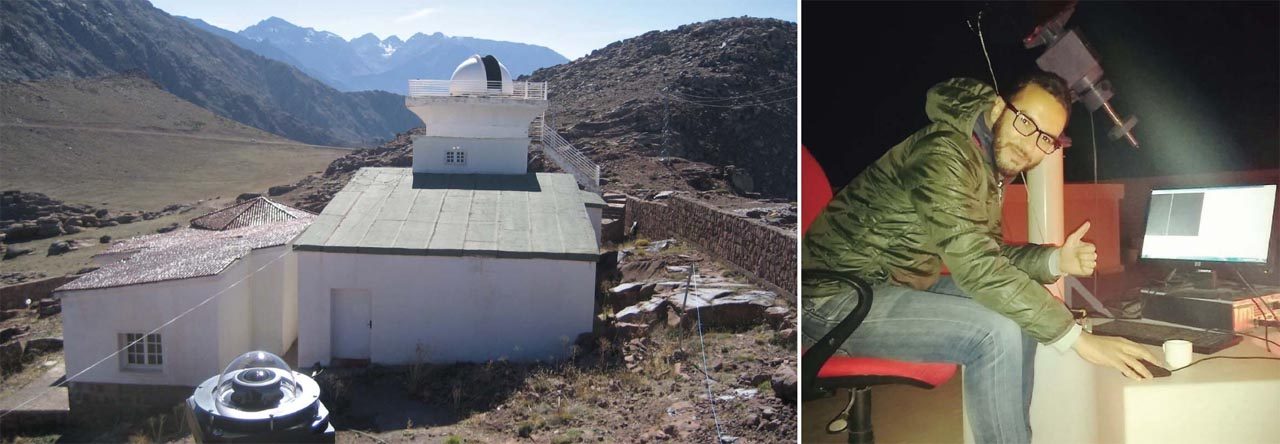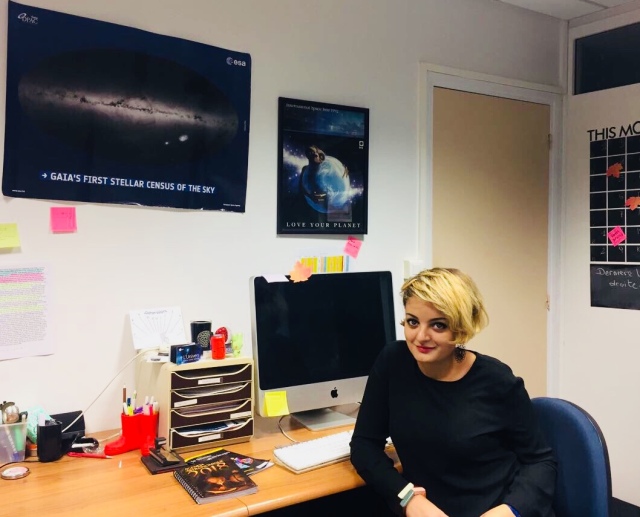PORTRAITS OF AFRICAN SCIENTISTS IN PLANETARY AND SPACE SCIENCE
The development of scientific research in the domain of planetary and space sciences in Africa depends to a large extent on a few individuals who focus their energy to this objective, with passion. The Africa Initiative for Planetary and Space Sciences, which has attracted worldwide attention, is willing to take the occasion to make these men and women more visible, by sharing their experiences on internet.
Today, the spotlight is on Meriem El Yajouri, a young woman from Morocco, passionate about Astronomy and who had the initiative of the SpaceBus operation in Morocco. Meriem has accepted to answer a few questions, and her answers are written down here. We hope that this discussion will be source of encouragement for all young students or research, who are willing to engage in this research area.
Can you tell us in a few words who are you, what are you doing at present and what is your background ?
My name is Meriem and I am 25 years old. I was born and raised in Morocco.
After the first year of a master’s degree in fundamental physics at Pierre and Marie Curie University, I followed the courses of the “astronomy, astrophysics and space engineering” master’s degree in the Île-de-France region.
Currently, I am a third year Ph.D. student at the Paris Observatory under the supervision of Rosine Lallement. Funded by the DIM ACAV (Domaine d’ Intérêt Majeur Astrophysique et Conditions d’Apparition de la vie), my thesis topic is on diffuse interstellar bands (or DIBs). The DIBs probably trace the largest reservoir of organic matter in the Galaxy, but their carriers are still unidentified. Understanding the nature, the evolution and the role of this matter in the stellar formation cycle is an essential issue for astrophysics, as is the link between these macromolecules and the appearance of life. Indeed, the organic materials present in comets and whose contribution to the appearance of life on Earth is defended by many scientists have probably an interstellar origin. Any new type of information on DIBs is therefore potentially important.
Alongside my research projects, I taught many courses at Paris Diderot University. This year, I am involved in science outreach at the Palais de la découverte.
When was your interest in astronomy, and what caused it?
As far back as I can remember, I always wanted to be an astrophysicist! When I used to go on holiday to visit my grandparents in Ouezzane, a small north-western town in Morocco, I spent my evenings eating figs and contemplating the sky to identify the constellations.
But my interest in astronomy has really become effective the day I realized I wanted to pursue a career in a multidisciplinary field crossing various techniques. I loved maths, physics, history of science, art, and philosophy. Is there a better way to get access to all of these subjects than astronomy? Then, the desire to continue in astronomy has become manifest.
Are there any encounters that have been decisive in your career’s path so far?
Oh yes, Absolutely! I could (and still can) draw my energy from a multitude of inspiring people and I found this source of energy throughout the years.
Paradoxically, the embittered and skeptical people who did not trust me were the ones who pushed me the most to persevere.
What role do your friends and family play in your activities?
At the beginning, they had a certain apprehension. But they soon realized that it was not just a passion but a life project.
Their support strengthened me in my choices.
I have a special thought for my parents who have not spared any effort to offer me the best possible studying conditions.
What actions in astronomy did you initiate in your country? What are you doing to share your passion?
I took up the challenge of organizing a space bus to promote astronomy in my country.
Spacebus Morocco 2016 is an itinerant scientific mediation operation which took place from September 30 to October 28. A truck designed for the occasion crossed 17 Moroccan villages and towns. About 15 000 people from all social categories were initiated to science through astronomy all along the 3000 km itinerary.

The idea of SpaceBus Morocco came to my mind in October 2015, after a meeting with researchers from the Paris Observatory who had be involved in SpaceBus Senegal. I felt in love with the concept and wanted to import and share it in my country.
In May 2016, I founded the association SpaceBus Maroc and throughout my PhD’s first year, I dedicated my free time to progressively achieve this project that meant a lot to me. And since there was a need to meet people and set up a team, I had to rely on several associations and experts at the scientific and organizational levels in France and Morocco.

Does Morocco have observatories and equipment for astronomy? If yes, which ones. Is it possible to conduct research activities in Astronomy in Morocco?
Located at 2700 m above sea level in the Atlas Mountains south of Marrakech, the Observatory of Oukaïmeden is the first professional observatory within a Moroccan university.

Today, the Observatory has gained international notoriety and its staff have several collaborations with researchers from all over the world. It is ranked among the top 10 in the world in the discovery of small bodies of the solar system. Moreover, the Observatory is associated with the recent discovery of the extrasolar system TRAPPIST-1. This is a long-term undertaking for our Moroccan researchers. A great success!
Furthermore, Morocco has clearly with several strong assets: its diverse topography, the exceptional quality of the sky, its political stability and geographical proximity to Europe. It is therefore very well positioned for hosting major observatories.
Do these observatories organize activities for the general public?
In Morocco, we have a dozen amateur astronomy associations. This rich and very active network of associations plays a central role in disseminating science to the general public. The oldest one is the Amateur Astronomy Association of Marrakech (3AM) which has been associated with the Observatory of Oukaïmeden since its creation in 1999. This association regularly takes action at the national level to promote astronomy and space sciences. I am very pleased to be recently appointed as a Board member of the association. We have organized this year the 18th edition of the Marrakech Astronomy Festival, the annual meeting of amateur astronomers and which represents a cultural and scientific flagship event of the region.
What are the obstacles and support to talk about astronomy in your country and build activities in this area?
I remember the remark of a colleague of mine, who once told me: ” You are undertaking a project with three disadvantages: you are young, a woman and still a student”. But against expectations, people decided to support me. I believe that the people generally wants to encourage students, they have hope in the youth and they want to see more women active and fighting in the scientific community.
We do not live in a fantasy land, far away from it… but things are moving forward and I chose the optimistic side.
SpaceBus is a proof of this, and this achievement is a symbol of the support and commitment that many public and private organizations, banks, companies, and foundations are showing to those who support the civic community. Then there are all the volunteers with all their skills who spent time to contribute to the success and scientific diversity of Spacebus Morocco. Without their help, this project would not have been possible.
Some people think that it is difficult to invest in the basic sciences in countries that face other priorities in health, nutrition, or security, for example. In your opinion, what can astronomy bring to a developing country?
It takes all sorts to make a world! We need farmers, doctors, engineers, writers, philosophers, artists, musicians… but we can never ignore the priority of education and science teaching. And astronomy happens to be a science that involves several disciplines and brings a very strong cultural mark.
Astronomy, beyond its educational dimension, is also a message of stability, openness, and tolerance, an inspiring message for all generations. Astronomy is about questioning our place in the universe, learning about the history of our existence, our history.
The question we should ask ourselves is: Could our civilization have evolved with a grey sky without stars?
You prepare a thesis at the Observatoire de Paris, has access to this training been simple for you, what obstacles did you have to overcome?
Not piece of a cake!
It was a difficult start. The field of research is very competitive, and the family and emotional ties, homesickness and the required level to get selected for a PhD program in Astronomy does not make it easy. It is a real obstacle course, especially for an expatriate student, but when you believe in it, you stick to your objectives and equips yourself with the resources you need, it pays off in the end.
What are your projects after your thesis defense, do you plan to return to Morocco, if so, what do you think you can bring to your country in astronomy / astrophysics?
Due to lack of long-term visibility, I cannot really answer this question.
Maybe the day I get out of school? (smiles…)
For the moment, I still want to learn and develop new skills. In the short-term, I plan to conduct research as a post-doctoral fellow in the United States or Europe.
One thing is certain, I have a strong desire to return one day to my country and make a significant contribution.
In conclusion, could you share a story, an anecdote, that marked your efforts to promote astronomy in Morocco ? And can you tell us your expectations regarding the Africa Initiative for Planetary and Space Sciences.
SpaceBus Morocco is a formative, enriching and human experience through which I learned a lot, but what I remember above all is that it is essential for us not to remain immobile and to continue to transmit and lead this fight for openness and scientific awakening. So the Africa Initiative for Planetary and Space Sciences comes just in time! I am convinced that with all these good intentions and by joining forces, the initiative will be successful in giving birth to very beautiful projects and I have accepted to be part of the steering committee of it.

To conclude, I share the touching expression of a friend after his experience of SpaceBus Morocco and which reflects well my thoughts:
“A general impression:
Diversity. Geographical, with mountains, ocean and sand. Human above all, with the variation of faces, languages, and ages. From the old man to the schoolgirl, we often find the same looks, filled with a flash of lucidity in the light of the eyepiece. Of course this is not always the case, some people are incredulous or disappointed, expected better, or expected nothing but were just curious. Others, on the contrary, already know how to do this, they have built their own windows to the sky, telescopes that are not found in catalogs. Impressive what you can do with a bicycle wheel or the engine of a parabolic antenna. It is at the heart of this abounding jumble that the Spacebus has cleared our way and that, it is not forgotten.


Pingback: Portraits – Meriem Elyajouri, 25 ans, Maroc – Africa Initiative for Planetary and Space Sciences
Pingback: The Moroccan National Outreach Committee (NOC) for the dissemination of Astronomy to the General Public has been restructured recently – Africa Initiative for Planetary and Space Sciences